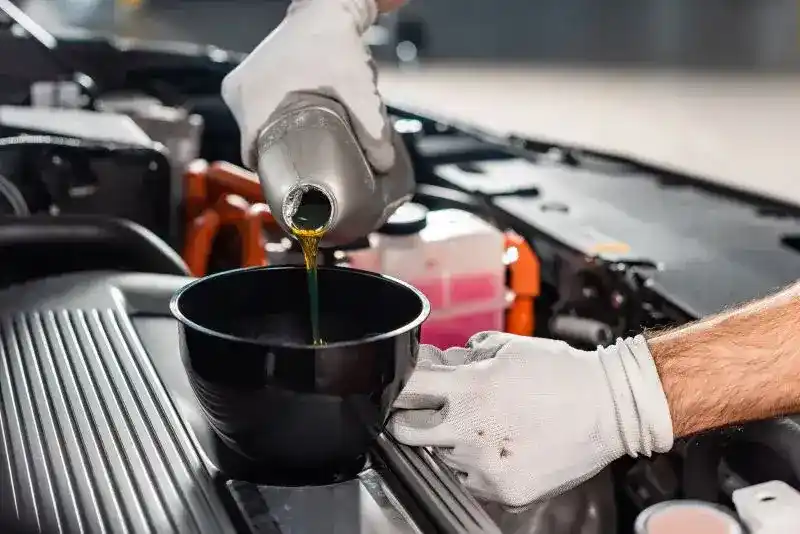What happens if you use the wrong engine oil?
05 Aug 2024

Engine oil is the lifeblood of your vehicle. It protects and enhances the performance of your engine, reduces friction, and ensures components run smoothly together, ultimately preventing breakdowns and repairs. But are all engine oils created equal? And what happens if you use the wrong engine oil?
In this article, we’ll find out why the type of engine oil you use is important, what the differences are, and what happens when you use the wrong one. We’ll also cover what to do if you discover you have used the wrong oil in your car.
Can I put any oil in my car?
The short answer is no, you can’t put any oil in your car. Just like humans have a blood type, engines have an oil that is specifically suited to support their long-term health and performance. Using the wrong type can cause serious damage to the internal components of your vehicle.
Engine oil is typically graded by viscosity, with internationally recognised grades developed by the SAE (Society of Automotive Engineers). You can check which grade of oil is recommended for your vehicle in the vehicle handbook, or by checking with your manufacturer.
There will also be other recommendations, including oil specifications such as API (American Petroleum Institute) and/or ACEA (European Automobile Manufacturers' Association) service categories and/or vehicle manufacturer specifications. You can use this information to buy engine oil that corresponds with these requirements.
What is oil viscosity, and why does it matter?
Oil viscosity describes how well the fluid flows – in other words, how ‘thin’ or ‘thick’ it is. Every engine oil is given a viscosity grade by the SAE. Viscosity changes with temperature, which is why every grade features two numbers, with a ‘W’ in the middle. The first number indicates the oil’s viscosity in low temperatures, and the second relates to the oil’s viscosity at higher temperatures.
While the brand of oil you use isn’t so important, choosing an oil with the correct viscosity grade is essential. This ensures your engine is always protected, whether you live in a mild climate with freezing winters, or a hot tropical one. Multigrade oils can perform at both high and low temperatures to improve cold starting while still safeguarding the engine.
What happens if you put the wrong oil in your car?
Putting the wrong oil in your car can lead to serious consequences. This includes:
Leaks: Older cars with a higher mileage need thicker oil to protect the engine better, while modern cars are designed to work with much thinner oil. If you use oil that is too thin for your car, it may cause the gaskets and seals to leak, while also failing to protect your engine properly.
Engine overheating: If you use an oil that is too thick for your car, it won’t flow properly through the internal components. If oil isn’t flowing properly, it will fail to reduce friction and therefore reduce heat effectively, leaving your engine in danger of overheating.
Reduced fuel economy: Using an oil that is too thick can also impact the fuel efficiency of your vehicle. Your car will require more energy to pump a highly viscous oil through the system, burning through fuel to overcome unusually high resistance.
Engine damage: Engine oils are an exact science. Each one is carefully formulated with a range of properties to protect and enhance the machinery it was made for. This includes specific additives such as rust inhibitors, anti-wear agents, and viscosity index improvers. Using the wrong type can wreak havoc on your engine, causing moving parts to wear prematurely due to inadequate lubrication. This can lead to costly repairs, replacement parts, and engine failure.
What are the symptoms of having the wrong oil in your car?
If you suspect you or a mechanic has used the wrong oil in your car, there are a few tell-tale signs to watch out for:
- Leaks
- Unusual engine sounds such as tapping or knocking
- A strange burning smell
- Poor fuel efficiency
- Failure to start in cold conditions
- Engine or oil-related warning lights
- Engine failure or overheating

What to do if you have put the wrong oil in your car
If you realise or suspect you have the wrong oil in your car, you should schedule an oil change with your mechanic immediately. Continuing to drive with the wrong oil in your car can create even more damage to your engine and is a serious safety concern.
When you take your car to the mechanic, they will:
- Drain the wrong oil from your engine.
- Replace the oil filter, as the wrong oil may have contaminated it.
- Refill your engine with the correct oil type and viscosity recommended by your car's manufacturer (you can find this information in your owner's manual).
- Check for any signs of damage caused by the wrong oil. In most cases, if you caught the issue early, there shouldn't be any problems.
How to prevent engine oil issues
To avoid putting the wrong engine oil in your car, always consult your owner’s manual before topping up or changing the oil. Do this even if you think you already know what type you need.
You should also ask your mechanic what type they are planning to use before an oil change, and double check it corresponds with the specifications recommended by your manufacturer.

